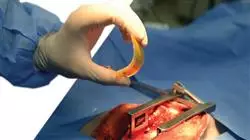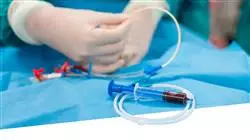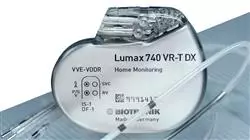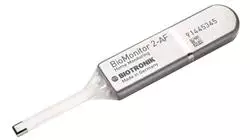University certificate
The world's largest faculty of medicine”
Description
Access a syllabus that covers Cardiac Arrhythmias in a comprehensive manner, from new developments in physiology and genetics to developments in the various devices and current clinical management"

In recent years, there have been numerous advances in the field of Cardiac Arrhythmias, both in cardiac stimulation and defibrillation devices and in the diagnostic procedures of electrophysiological studies and ablation. One of the main problems in the field of arrhythmias is the late diagnosis of most pathologies, or the intrinsic difficulty of providing information tailored to the pathologies and conditions of each patient.
Therefore, the work of updating the specialist in this area is essential to ensure good professional practice. Advances such as genetic studies for prevention, pharmacogenomics or even developments in the treatment of athletes are a great advantage for every Cardiology Unit.
TECH has brought together a team of professional cardiologists from prestigious hospitals, where they have developed and put into practice the most recent advances in Cardiac Arrhythmias. In this way, the student is brought closer to the latest developments in this medical area, in a much more effective way. In addition, this professional master’s degree offers a comprehensive approach to arrhythmias, with an innovative and practical approach so that specialists can incorporate the latest and most effective developments in the area into their daily work.
All this in a convenient 100% online format that respects the high professional and personal demands of the specialist. There are neither face-to-face classes nor fixed schedules, with total freedom to decide how the entire teaching load is distributed. The virtual classroom is available 24 hours a day, with all the educational material of the program available for download from any device with an Internet connection.
You will have a large amount of audiovisual material available for each of the units, including clinical videos of real cases and videos in detail on the most important concepts"
This professional master’s degree in Cardiac Arrhythmias contains the most complete and up-to-date scientific program on the market. The most important features include:
- The development of practical cases presented by experts in Cardiology
- The graphic, schematic, and practical contents with which they are created, provide scientific and practical information on the disciplines that are essential for professional practice
- Practical exercises where self-assessment can be used to improve learning.
- Its special emphasis on innovative methodologies
- Theoretical lessons, questions for experts and individual reflection work
- Content that is accessible from any fixed or portable device with an Internet connection
Incorporate into your daily practice the most relevant advances and developments in Cardiac Arrhythmias, with the guarantee of quality and efficacy of a teaching staff that knows them first hand"
The program includes, in its teaching staff, professionals from the sector who bring to this education the experience of their work, in addition to recognized specialists from prestigious reference societies and universities.
Its multimedia content, developed with the latest educational technology, will allow the professional a situated and contextual learning. In other words, a simulated environment that will provide immersive education programmed to prepare for real situations.
This program is designed around Problem-Based Learning, whereby the professional must try to solve the different professional practice situations that arise during the academic year. This will be done with the help of an innovative system of interactive videos made by renowned experts.
You decide where, when and how. You can download the entire syllabus and distribute it according to your own pace and interests"

You will find entire topics dedicated to Ventricular Tachyarrhythmias, Supraventricular Tachyarrhythmias, Atrial Fibrillation, Bradyarrhythmias and more pathologies in the field of Cardiac Arrhythmias"
Objectives

You will have the support and assistance of the world's largest online academic institution"
General Objectives
- Update general knowledge as well as the most innovative aspects of cardiological processes involving cardiac rhythm disorders
- Delve into the clinical management and indications of the different procedures performed for the diagnosis and treatment of these cardiac conditions
- Delve into the diagnosis and treatment of arrhythmias, based on clinical and electrocardiographic aspects as well as invasive techniques and electrophysiological studies
- Broaden knowledge in the operation, monitoring and implantation technique of the main implantable devices used for the treatment of arrhythmias
- Delve deeper into the problems in cardiac rhythm disorder that can arise across the spectrum of patients
- Achieve a mastery of the rhythm disorder problems present in the various scenarios faced by the cardiologist in his or her routine clinical practice
Specific Objectives
Module 1. Arrhythmias. Fundamental Concepts
- Understand the fundamental mechanisms that produce arrhythmias, including cellular physiology, the conduction system, cardiac anatomy of arrhythmias (with the addition of a radiological approach) and the role of genetics
- Review the most common antiarrhythmic drugs, focusing on their most important indications, contraindications and common adverse effects
- Review basic diagnostic techniques and common procedures in the Electrophysiology Department
Module 2. Bradyarrhythmias
- Know the definition and types of Bradyarrhythmias, as well as their basic mechanisms
- Review the studies available for its diagnosis and characterization
- Study in depth the fundamental groups of Bradyarrhythmias (sinus node disease and AV block), with special emphasis on diagnosis and treatment
- Delve into the study of the patient with syncope from mechanisms and causes to diagnosis and treatment
- Review in detail the current indications for pacemaker implantation
Module 3. Supraventricular Tachyarrhythmias
- Know the definition and types of Supraventricular Tachyarrhythmias. Understand the differential diagnosis between these types
- Understand the management of these arrhythmias in the acute (emergency) and chronic (consultation) setting
- Review the main aspects of the electrophysiological study of these arrhythmias
- In-depth study of the epidemiology, clinical presentation, characteristics of the electrophysiological study and ablation techniques in the 4 main types of supraventricular tachyarrhythmias (nodal reentrant
- tachycardia, AV reentrant tachycardia, common atrial flutter and focal atrial tachycardia)
Module 4. Ventricular Tachyarrhythmias
- Review the key aspects of its diagnostic process, with a clinical and electrocardiographic approach. Review the electrocardiographic differential diagnosis between wide QRS tachycardias
- Know the approach to these arrhythmias in the acute (emergency) and chronic (consultation) setting
- Review the pharmacological treatment of these arrhythmias
- In-depth study of the specific electrophysiological study of these arrhythmias, as well as the therapeutic approach using ablation techniques
- Review the knowledge of Ventricular Extrasystole, from its mechanisms and initial approach, to therapeutic strategies, including the specific electrophysiological study
Module 5. Devices (Pacemaker, ICD and Resynchronizer)
- Review in detail the indication of pacemakers, their implantation technique, their basic operation, as well as the programming modes and other aspects of monitoring
- Review in detail the indication for ICD, as well as the particularities of the implantation technique, operation and programming/monitoring
- Know the differential aspects of the novel physiological pacing techniques, as well as their current indications and future perspectives
- Know other current implantable devices: Leadless pacemaker and subcutaneous ICD. Review their indications
- Update on the electrode extraction technique and its indications
Module 6. Atrial Fibrillation
- Review the importance of Atrial Fibrillation: epidemiology and socioeconomic impact
- Review the main clinical aspects and initial diagnostic approach
- A detailed update on the complete management of Atrial Fibrillation, starting with the prevention of thromboembolism and continuing with the clinical management strategy
- Delve into the Atrial Fibrillation ablation technique: indication, evidence, technique and expected results. Review the future of this technique
- Review the particularities of AF in other specific contexts and anticoagulation therapy in the patient with ischemic heart disease
Module 7. Arrhythmias and Heart Failure
- Review the importance of rhythm disorders in heart failure
- Know in depth the importance of the AF-Heart Failure relationship, from its epidemiology to its prognostic implication
- Review the role of antiarrhythmic drugs, especially ablation, in the management of AF in patients with heart failure
- Update on the assessment of ventricular arrhythmias in heart failure, delving into the role of genetics and MRI
- Review the current indications for CRS therapy and other devices in HF
- Learn about the novel aspects of physiological stimulation therapies
- Review the concept of Tachycardiomyopathy with a broad approach, including its epidemiology, diagnosis and treatment, both pharmacological and electrophysiological
Module 8. Arrhythmic Syndromes, Sudden Cardiac Death and Channelopathies
- In-depth knowledge of sudden cardiac death: concept, epidemiology, causes, diagnostic study and clinical management
- Review the concept of channelopathies and their epidemiology
- Review the fundamental aspects of the most frequent channelopathies: Brugada Syndrome and Long QT Syndrome
- Learn the role of genetics in these entities. Review the indications for family studies and how to perform them
Module 9. Cardiomyopathies and Arrhythmias
- Review the general aspects of arrhythmias associated with cardiomyopathies
- Review the characteristics of the most frequent arrhythmias in dilated cardiomyopathy and arrhythmogenic dysplasia
- Delve into the prevention and management of ventricular arrhythmias, reviewing the indications for ICD in these pathologies
- Learn about the role of genetics in this context
- Review the rhythm disorders associated with other less frequent cardiomyopathies
Module 10. Arrhythmias in Other Clinical Contexts
- Review the most common arrhythmias in patients without heart disease and in athletes
- Review the most common arrhythmias in the critically ill cardiac patient. Know their epidemiology, diagnosis and management
- Know in detail the therapeutic algorithm of arrhythmic storm
- Review the indications and technique of transient pacemaker implantation
- Review the most frequent arrhythmias in the non-cardiac critical patient, after cardiac surgery and after TAVI, with special attention to their management
- Review, in general, the most prevalent arrhythmias in patients with congenital heart disease, as well as their fundamental implications and particularities of management

Achieve your goal of staying completely up to date with this innovative program"
Professional Master's Degree in Cardiac Arrhythmias .
Faced with the increase in the number of cases in which patients present some alteration in their cardiac rhythm, as well as in the mortality rate because of it, it is necessary to have the methods, tools and highly qualified medical personnel to respond adequately and mitigate its incidence. At TECH Global University we have developed the Professional Master's Degree in Cardiac Arrhythmias, a program that will allow you to expand your knowledge in the various causes related to this heart disease, including issues associated with obesity, alcohol consumption, sedentary lifestyle or hereditary factors, as well as the most effective intervention and treatment techniques. In this way, relying on the solid foundations of a complete preparation, you will obtain favorable results and offer a service of the highest quality.
Specialize in the largest medical school
.
If you want to stand out as an expert in the approach to cardiac arrhythmias, become a fundamental piece for the current labor market and revalue your professional profile, our Master is the right one for you. You will deepen in the concepts, topics and most innovative aspects developed in the cardiological processes for the clinical approach of cardiac rhythm disorders; and you will apply the electrocardiographic tools necessary for the diagnosis and treatment of these conditions, from electrophysiological studies to invasive techniques such as implantation of assistive devices. At the largest School of Medicine, you will have access to a unique graduate program that will foster the acquisition of new methods, strategies and resources to optimize the performance of your work.







